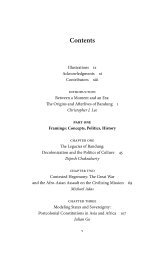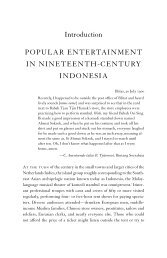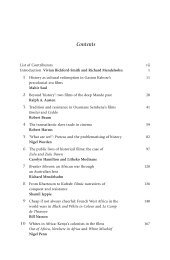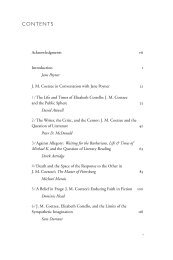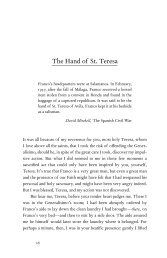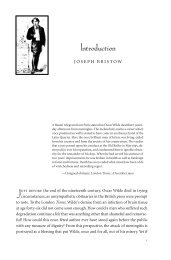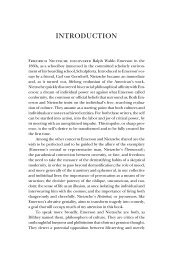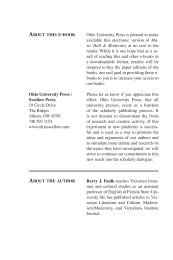Race, Revolution, and the Struggle for Human Rights in Zanzibar ...
Race, Revolution, and the Struggle for Human Rights in Zanzibar ...
Race, Revolution, and the Struggle for Human Rights in Zanzibar ...
Create successful ePaper yourself
Turn your PDF publications into a flip-book with our unique Google optimized e-Paper software.
trees. Each of <strong>the</strong> communities also experienced its own sharp divisions;<br />
South Asians, <strong>for</strong> example, were H<strong>in</strong>du, Sikh, Parsee, or members of<br />
semiexclusive Muslim sects such as <strong>the</strong> Ismaili <strong>and</strong> Bohora communities.<br />
Africans were divided by ethnic identity. Former slaves <strong>in</strong> both Unguja<br />
<strong>and</strong> Pemba sought <strong>in</strong>clusion <strong>in</strong> isl<strong>and</strong> society by acquir<strong>in</strong>g l<strong>and</strong> <strong>and</strong> by<br />
adopt<strong>in</strong>g <strong>the</strong> dress <strong>and</strong> manners of wealthier isl<strong>and</strong>ers. They sometimes<br />
adopted ethnic markers, such as Swahili, Hadimu, <strong>and</strong> Shirazi, which<br />
obscured <strong>the</strong>ir slave orig<strong>in</strong>s <strong>and</strong> identified <strong>the</strong>m as free <strong>and</strong> established<br />
members of coastal society; such markers also dist<strong>in</strong>guished <strong>the</strong>m from<br />
more recent African migrant workers from <strong>the</strong> ma<strong>in</strong>l<strong>and</strong>. 38 <strong>Zanzibar</strong>’s<br />
two pr<strong>in</strong>cipal isl<strong>and</strong>s, Unguja <strong>and</strong> Pemba, were also remarkably dissimilar:<br />
communal relations were more harmonious <strong>in</strong> Pemba than <strong>in</strong> Unguja.<br />
In Pemba, longst<strong>and</strong><strong>in</strong>g cultural <strong>and</strong> economic ties, along with high<br />
levels of <strong>in</strong>termarriage, tended to dim<strong>in</strong>ish <strong>the</strong> importance of racial or<br />
ethnic differences, whereas, on Unguja, African grievances toward Arabs<br />
over l<strong>and</strong> <strong>and</strong> labor were especially acute. As a result, Africans <strong>in</strong> Unguja<br />
were more will<strong>in</strong>g than those <strong>in</strong> Pemba to transcend <strong>the</strong>ir ethnic differences<br />
<strong>in</strong> order to oppose Arab political objectives.<br />
Times, fur<strong>the</strong>rmore, were chang<strong>in</strong>g. The long-term trend <strong>in</strong> both<br />
isl<strong>and</strong>s was <strong>for</strong> Africans to improve <strong>the</strong>ir position gradually <strong>in</strong> <strong>the</strong> agricultural<br />
sector relative to Arabs, who commonly mortgaged <strong>the</strong>ir plantations<br />
to South Asian creditors, lived <strong>in</strong> cont<strong>in</strong>ual debt, <strong>and</strong> were<br />
<strong>in</strong>creas<strong>in</strong>gly “peasantised.” 39 The ga<strong>in</strong>s made by African small l<strong>and</strong>holders<br />
were not matched, however, by sizable ga<strong>in</strong>s <strong>in</strong> ei<strong>the</strong>r education or employment<br />
<strong>in</strong> <strong>the</strong> colonial adm<strong>in</strong>istration. By <strong>the</strong> 1950s, Arabs <strong>and</strong> South<br />
Asians, aside from a few hundred British expatriates, dom<strong>in</strong>ated <strong>the</strong> civil<br />
service; <strong>and</strong> <strong>in</strong> <strong>the</strong> <strong>in</strong>creas<strong>in</strong>gly important sphere of Western education,<br />
Africans were dramatically underrepresented. If colonial schools were<br />
<strong>the</strong> means by which many Africans sought to access <strong>the</strong> knowledge,<br />
skills, <strong>and</strong> positions of more urbanized <strong>and</strong> cosmopolitan communities,<br />
progress was slow <strong>and</strong> a matter of frustration.<br />
Empires by <strong>the</strong>ir nature encourage cosmopolitanism, <strong>and</strong> <strong>the</strong> isl<strong>and</strong>s<br />
cont<strong>in</strong>ued to receive migrants throughout <strong>the</strong> colonial era from around <strong>the</strong><br />
Indian Ocean rim: ma<strong>in</strong>l<strong>and</strong>er Africans, Arabs, Goans, <strong>and</strong> Comorians.<br />
Outside of <strong>Zanzibar</strong> Town, <strong>the</strong> British didn’t undertake any revolutionary<br />
schemes, satisfied <strong>for</strong> <strong>the</strong> most part to collect taxes, en<strong>for</strong>ce <strong>the</strong> law,<br />
<strong>in</strong>vest <strong>in</strong> public works, <strong>and</strong> manage <strong>the</strong> clove <strong>in</strong>dustry. Rural life was<br />
often slow <strong>and</strong> isolated. Life <strong>for</strong> town residents, however, was often a<br />
cosmopolitan feast of <strong>the</strong> senses: cafes offered African, Arabic, Indian,<br />
<strong>and</strong> Ch<strong>in</strong>ese dishes, <strong>and</strong> c<strong>in</strong>emas packed <strong>in</strong> audiences nightly to see<br />
everyth<strong>in</strong>g from American Westerns to Egyptian dramas <strong>and</strong> Indian<br />
Cosmopolitanism <strong>and</strong> Its Discontents 17



